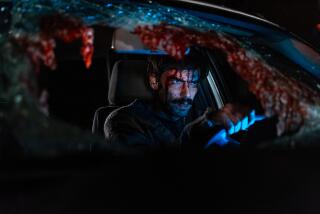Kurosawa’s ‘Hidden Fortress,’ ‘Crouching Tiger’ Hit DVD
- Share via
Digital entertainment means movies as well as games today, in tens of millions of U.S. homes with desktop and laptop computers equipped with DVD-ROM drives, Sony PlayStation 2s and dedicated DVD players.
Unlike games, which are completely computer-made, most movies are old-new technology hybrids: shot on film stock, transferred to digital media for the post-production process, transferred back to film for the theatrical run, then digitized again for home video release on 5-inch DVDs.
All-digital cinema’s evolution will get a boost in 2002, when the next installment of “Star Wars” arrives. Much of it is being shot digitally, so live-action and computer-created characters and effects will blend seamlessly. And George Lucas wants it shown as widely as possible on computer-based projection systems. At least 200 theaters will have the ability to do so by next summer, according to Variety.
Meanwhile, DVDs are not only the best-looking showcase for movies, but offer bonus features that provide insights into the dynamics of the creative process and behind-the-camera visits with the filmmakers.
Media-shy Lucas, for example, willingly faced a video camera in January to pay tribute to one of his idols, Akira Kurosawa. On the newly released DVD edition of “The Hidden Fortress,” Lucas delivers a brief but perceptive analysis of what made Kurosawa a world-class film artist and reveals how “The Hidden Fortress” influenced him in writing the original “Star Wars” script.
The 1958 black-and-white epic about civil war between rival clans in medieval Japan features a feisty princess, the last of her dynasty, who takes refuge from pursuing troops in a remote hide-out after the defeat of her army. Her guardian is a samurai general (morphed into a Jedi knight in “Star Wars”). The story of “The Hidden Fortress” is told through the eyes of two lowly characters, peasant buffoons (converted into droids in “Star Wars”).
“The Hidden Fortress” ($30) is the most recent DVD addition to the Criterion Collection, the Rolls-Royce of classic movie libraries. The image and sound have been digitally restored, the English subtitles have been fine-tuned, and the original theatrical trailer is included. If you enjoy “The Hidden Fortress,” be advised that Lucas’ favorite Kurosawa films, “Seven Samurai” and “Yojimbo,” are also available on DVD from Criterion.
Produced a year later, in 1959, “Some Like It Hot,” which the American Film Institute last year named “the funniest movie ever made,” has also just debuted on a special-edition DVD ($25, from MGM). Besides a cosmetic “scrub” of the aging print’s blemishes, the digital transfer enhanced the film’s black-and-white contrasts and remixed the audio as a Dolby Digital soundtrack. There’s a trailer, behind-the-scenes photo albums of Marilyn Monroe, Tony Curtis and Jack Lemmon, and a group interview with five of the musicians in the film’s female band. (Curtis and Lemmon, on the run from gangsters, dress up as women, join the band and become Monroe’s pals.)
The disc’s most fascinating bonus is a lengthy interview with Curtis reminiscing about the making of the movie.
If you rent or buy just one of the new movie releases on DVD, make it “Crouching Tiger, Hidden Dragon” ($28, from Columbia TriStar), winner of four Oscars, including best foreign-language film, a masterpiece combining awesome action and deeply felt emotion. The jaw-dropping sword and kung fu battles were choreographed by Yuen Wo Ping, the stunt master of “The Matrix,” and directed by Ang Lee (“Sense and Sensibility”). The fairy-tale-like romantic adventure was shot in China using digital special effects to replicate Beijing of 400 years ago.
The DVD does justice to the film’s magical images and evocative soundtrack. And the disc is crammed with extras: an excellent Bravo making-of documentary; a conversation with action star Michelle Yeoh; audio commentary by the director and producer; Dolby Digital sound; and the choice of listening to the cast speaking original Mandarin (with English subtitles), or dubbed into English or French.
More to Read
The biggest entertainment stories
Get our big stories about Hollywood, film, television, music, arts, culture and more right in your inbox as soon as they publish.
You may occasionally receive promotional content from the Los Angeles Times.










